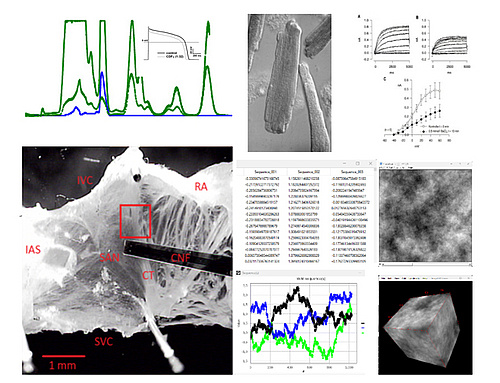-
Die Universität
- Herzlich willkommen
- Das sind wir
- Medien & PR
-
Studium
- Allgemein
- Studienangebot
- Campusleben
-
Forschung
- Profil
- Infrastruktur
- Kooperationen
- Services
-
Karriere
- Arbeitgeberin Med Uni Graz
- Potenziale
- Arbeitsumfeld
- Offene Stellen
-
Diagnostik
- Patient*innen
- Zuweiser*innen
-
Gesundheitsthemen
- Gesundheitsinfrastruktur
Forschungsteam Pelzmann & Ahammer
Forschungsschwerpunkt Translationale Aspekte der zellulären Elektrophysiologie und Komplexe Systemanalyse
Schwerpunkt: Translationale Aspekte der zellulären Elektrophysiologie
Erforschung der physiologischen und pathophysiologischen Rolle von Ionenströmen in Herzmuskel- und Krebszellen sowie der in silico Modelierung der zugrundeliegenden bioelektrischen Vorgänge.
Vernetzung: In Zusammenarbeit mit Helmut Ahammer wird die Schlag-zu-Schlag Variabilität im Sinusknoten mithilfe nicht-linearer Analysemethoden untersucht. Mit Seth Hallström, Bruno Podesser (Zentrum für Biomedizinische Forschung und Translationale Chirurgie, Medizinische Universität Wien) und Gerhard Cvirn (Otto Loewi Forschungszentrum, Lehrstuhl Physiologische Chemie, Medizinische Universität Graz) werden die kardiodepressiven Effekte eines klein-molekularen Peptids, isoliert aus dem humanen Plasma, auf zellulärer Ebene untersucht. In Kooperation mit Sonja Langthaler und Niroj Shrestha wird die Rolle des Zellmembranpotentials als biophysikalisches Schlüsselsignal bei der Regulierung der Proliferation und des Zellzyklusverlaufs in Krebszellen untersucht.
Schwerpunkt: Comsystan - Komplexe Systemanalyse
Der Schwerpunkt liegt auf der fraktalen Analyse von digitalen Bildern und nichtlinearer Zeitreihen. Digitale Bilder in der Biologie und Medizin weisen oft sehr unregelmäßige und verzweigte Strukturen auf, die nicht durch die euklidische Geometrie quantitativ beschrieben werden können. Die Anwendung einer skalenfreien Morphologie ermöglicht eine umfassende Beschreibung von Formen und Gebilden, die Selbstaffinität und ausgeprägte raumfüllende Eigenschaften aufweisen. Es werden neue Algorithmen zur Bestimmung fraktaler Dimensionen von 2D-Bildern und 3D-Bildstapeln entwickelt (Pyramiden-Dimension, Higuchi-Dimension, Tug of War Lacunarity). Fraktale Dimensionen ermöglichen eine Unterscheidung verschiedener Texturtypen. Anwendungen sind intraepitheliale Neoplasien, Nervenfasern, Gliomzellen, Krebsinvasionen oder AVM.
Gemessene Zeitsignale zeigen inhärent deterministische oder stochastische Schwankungen. Nichtlineare Analysen wie fraktale Dimensionen, trendbereinigte Fluktuationsanalysen oder Entropien messen die Variabilität eines Signals und lassen dabei absoluten Auslenkungen außer Acht. Anwendungen sind autorhythmische Herzzellen und -gewebe oder das menschliche Gleichgewicht und der Schwindel.
Software-Entwicklung:
Fiji/ImageJ2-Plugins für die Komplexitätsanalyse von digitalen Bildern und Zeitsignalen [ComsystanJ].
Kooperationen:
Martin A Reiss, [NASA]
Ion Andronache, [CAIMT]
Marko Radulovic, [IORS]
Fabián Labra-Spröhnle, [Noologica]
Herbert F Jelinek, [HEIC]
Projekte
Elektrophysiologische Charakterisierung der induzierten Zellalterung zur Krebstherapie
Im Rahmen des Projektes soll die mögliche Rolle des Membranpotentials bei der Ausbildung zellulärer Seneszenz in Krebszellen erforscht werden. Dazu wird das Membranpotential von zyklischen, ruhenden und seneszenten A549-Zellen herangezogen, um festzustellen, ob dieses charakteristische Veränderungen erfährt und somit einen entscheidenden Faktor und mögliches Target für die Ausprägung von Seneszenz darstellt. Dazu soll eine effiziente Methode zur Messung des Membranpotentials mithilfe eines spannungssensitiven Farbstoffes, die die gleichzeitige Messung mehrerer Zellen gleichzeitig erlaubt, entwickelt werden. Der Farbstoff soll durch patch-clamp Experimente in Kombination mit Fluoreszenz-Messungen in transfizierten Krebszellen kalibriert werden.
Laufzeit: 01.02.2024-31.07.2025
Gefördert durch: Land Steiermark, Graz, Österreich
Projektpartner*innen: Priv.-Doz. Dipl. Biochem. Dr. med. Eleonore Fröhlich (Abteilung Zentrum für Medizinische Forschung, ZMF, Medizinische Universität Graz), Dipl. Ing. Dr. techn. Sonja Langthaler



